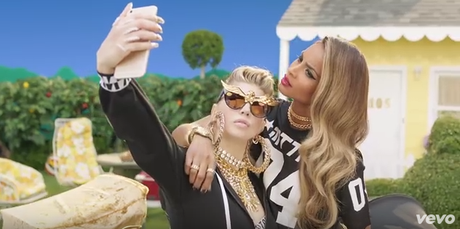
M.I.L.F. $
The first time I heard Fergie’s “M.I.L.F. $,” I genuinely thought it was a joke.
“Wow, Fergie’s just desperately trying to stay relevant,” my friend declared. I laughed in agreement. The song’s blatant auto-tuning, remixed dance track, and seemingly nonsensical lyrics made her observation obvious to me.
But then the same friend and I watched the song’s music video. The “M.I.L.F. $” video left us staring at the screen in shock, wondering how such a horrible song had somehow turned into a tongue-in-cheek, clever presentation of an arguably feminist message.
To break it down, the music video’s message is this: Yes, we are mothers. But that doesn’t mean that we can’t also work and make money and provide for our families. Though I had initially written them off, the lyrics do also support the notion that these ladies find empowerment in making money as well as being moms. Fergie sings:
“Cause I-N-D-E-P-E-N-D-E-N-T / Do you know what that means? / Can’t see me B-R-O-K-E / I’m P-A-I-D / You heard about me, I’m saying / You got that, you got that, you got that milk money / I got that, I got that, I got that MILF money.”
The video, which features powerful working mothers like Kim Kardashian, Chrissy Teigan, Ciara, Alessandra Ambrosio, and Amber Valletta reminds viewers and listeners that women can have both careers and be mothers — an important departure from the age-old cultural message that women must choose one or the other, that being female means sacrificing one role for the other in a way men never have to.
The video is also hardly subtle about highlighting these M.I.L.F.s’ sexuality and sexual appeal. While some might interpret this as further breaking sexist, limiting stereotypes about women and motherhood, it’s an aspect of the video many commenters picked up on. It even prompted some to disagree with the idea that the song has any merit as a feminist anthem at all. Large swathes of women and men alike have noted that the overexposure of the women in the video only perpetuates the over-sexualization of women in the entertainment industries overall. Others expressed concern that the music video does little to help the fight to de-sexualize breastfeeding, as there are many moments when the moms in the video pour milk on themselves in a suggestive way.
But although these points are certainly valid, others still have chimed in with well-reasoned responses. It’s an issue of control, many claimed: Is a woman really being sexualized if she’s making the choice to display herself in that way? For many women, taking control of and embracing their sexuality is empowering. Considering there was very little actual breastfeeding in the video, and the breastfeeding displayed was treated normally and casually, it also seems like the argument could be made that the video works to normalize rather than sexualize this act.
The moral of the story is this: There are no clear cut answers. While some people feel the video is improper and over-sexualized, there are also plenty of women who find it empowering. Hopefully, this video will prove to be just one of many examples of women standing up for their right to work and be mothers at the same time without losing their autonomy, sexuality, or any other aspect of their identity.

